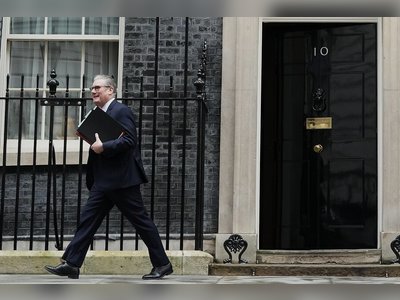
Why Liberals Pretend They Have No Power
Elite politicians invoke the rhetoric of national emergency only to behave like hapless passengers trapped aboard a sinking ship.
At a press conference in September, House Speaker Nancy Pelosi fielded questions about the perilous backdrop to November’s election. Denouncing Donald Trump’s refusal to commit to a peaceful transfer of power should he be defeated, Pelosi was unequivocal: “You are not in North Korea; you are not in Turkey … You are in the United States of America. It is a democracy, so why don’t you just try for a moment to honor your oath of office to the Constitution of the United States?” Only moments later, Pelosi dismissed calls that she leverage her role as speaker to shut down the U.S. government in an effort to block Trump’s incoming nominee for the Supreme Court.
The contrast between the two comments was stark. The first conveyed a sense of emergency, gravely implying (not without cause) that the very foundations of America’s democratic and constitutional order were in danger. The second, particularly if we accept that premise, amounted to nothing less than an abdication of responsibility from one of the country’s most powerful figures during a moment of national crisis.
A sitting president openly flouting the rules of democracy represents a serious enough threat on its own; if the prospect of a Supreme Court appointment weeks before an election whose outcome could well be decided by that very body is not an appropriate moment for vigorous opposition, then what is?
This tension underscores a deeper paradox of liberalism that has arguably reached its apex in the Trump era. Since the president’s election four years ago, the political and intellectual leaders of America’s supposedly reform-minded opposition have issued warnings about the existential threat that Trump poses to democracy.
Amid it all, senior Democrats have mostly maintained both the regular operation of government and a standard of congressional etiquette that connotes normalcy more than it does any state of exception: applauding the president’s speeches, approving his military budgets, awarding him new domestic spying powers, and even fast-tracking his judicial nominees. A line from one 2019 CNBC report detailing the overwhelming House approval of Trump’s marquee NAFTA renegotiation sums up the absurdity of this posture: “Democrats also wanted to show they can work with Trump only a day after they voted to make him the third president impeached in American history.”
Determined opposition to Trump has sometimes been so nonexistent that Democratic partisans have had to invent it, as when an image of Pelosi during the 2019 State of the Union address went viral on the entirely spurious grounds that the speaker had intended for her clapping to look sarcastic.
Liberalism in the Trump era has thus become a kind of strange pantomime act in which elite politicians deploy the rhetoric of imminent threats and national emergency only to behave like hapless passengers trapped aboard a sinking ship. Although it has certainly found its most potent expression in Washington, this posture of feigned powerlessness has gradually come to infect the broader culture and ideology of American liberalism as a whole.
Even in solidly blue states where Democrats face none of the institutional impediments that confront them in Washington, D.C., robust progressive legislative agendas are rare.
Powerful figures such as New York Governor Andrew Cuomo and California Governor Gavin Newsom issue bulletins about climate change that read more like desperate pleas from activists than statements by sitting governors with the power to make and alter laws. (In response to the recent wildfires raging across the West Coast, Newsom announced that he has “no time for climate-change deniers,” despite having approved some 48 new fracking permits since April. Cuomo tweeted, “This is what climate change looks like.
The proof is right in front of us. This is a national emergency-it’s now or never.”) The Democratic Party’s 2020 nominee for president, meanwhile, is a former vice president who pledges to reform corporate America through “non-legislative” means and proudly champions the idea that “nothing fundamental” needs to change. On issues as varied as the environment, racial oppression, and immigrant rights, the culture of liberalism has rarely been so suffused with a language of moral urgency and social justice; as an institutional and ideological presence in American life, its politics has rarely been so unambitious or shy of confrontation.
The contradictory posturing of today’s most powerful liberals is not fully attributable to the shock and disorientation brought about by the 2016 election; its roots go back to the Clinton era at least-the period (not incidentally) when Democratic leaders formally abandoned their commitment to the New Deal and absorbed key parts of a Republican agenda.
American liberalism has always had a technocratic streak, but the disappointments experienced by liberals since the end of the 1960s enabled a new generation of more conservative Democrats to restructure the liberal coalition and redefine both its style and its political priorities. In the past few decades, the party has avoided embracing a clearly defined progressive program or engaging in the politics of confrontation. Whereas the consensus put in place by Franklin D. Roosevelt was achieved through open conflict with powerful forces in American society, the lodestars of the new liberalism became compromise and conciliation with the right.
While FDR forged a lasting political settlement around welfarism and an activist state against the wishes of much of America’s corporate establishment, the Clinton administration would famously denounce the scourge of “Big Government” and declare “the end of welfare as we know it.” The Bill Clinton adviser Dick Morris even summed up the administration’s strategy in a memo as follows: “Fast-forward the Gingrich agenda.”
Accordingly, key parts of the conservative agenda were absorbed into American liberalism, which would now make a virtue out of both bipartisan compromise and ideological triangulation.
This style found its ultimate expression in Barack Obama, who masterfully paired a sonorous rhetoric of optimism with, to paraphrase the political scientist Corey Robin, a “moral minimalism” that rendered Democrats not so much unprepared for a fight with their Republican foes as indisposed to the very idea of one.
Beginning with the hopeful cadence of “Yes we can!” and ending, after a slew of congressional defeats, with the election of Donald Trump, the Obama era has served to convince many liberals of the need to compromise even further-anything remotely ambitious being doomed to fail on the altars of conservative partisanship and Republican obstruction. (Rampant opposition to Medicare for All from centrist Democrats despite its considerable popularity has been justified on these grounds for years.)
Partly in response to the limitations of Obama-era liberalism, the left (notably, though not exclusively, in Bernie Sanders’s two presidential campaigns) has embraced something like an inverse strategy: mobilizing around ambitious, popular policies and openly naming the forces and interests that stand in their way.
The standard rejoinder is that the American left is detached from the political realities of a system that makes changing anything exceptionally difficult. On short-term pragmatic grounds, this argument obviously has a certain force: Pelosi can’t single-handedly stop the president from behaving dangerously in advance of November’s election any more than Newsom or Cuomo can arrest the progress of climate change.
Democrats might grind the federal government to a halt to prevent Amy Coney Barrett’s nomination to the Supreme Court, only to find themselves outflanked by Trump and Senate Majority Leader Mitch McConnell. But until such an effort is actually mounted, we will never know what it might achieve. The same logic applies in the longer term to popular policies such as Medicare for All and the Green New Deal.
It’s all well and good to recognize the structural constraints imposed by America’s political system, and the difficulty of passing major reforms in the face of organized opposition. But for too many of America’s leading liberal politicians, “realism” has become an identity unto itself, unmoored from any programmatic orientation toward the future or sustained effort to bring about significant change.
Transformation on the scale necessary to undo the ravages of the Trump presidency will certainly be difficult to achieve, the fight for larger objectives such as health-care reform and a green industrial revolution harder still. But given what the leaders of 21st-century liberalism themselves tell us about the state of things, what is the alternative? There’s no reason to surrender when you can fight.
The contrast between the two comments was stark. The first conveyed a sense of emergency, gravely implying (not without cause) that the very foundations of America’s democratic and constitutional order were in danger. The second, particularly if we accept that premise, amounted to nothing less than an abdication of responsibility from one of the country’s most powerful figures during a moment of national crisis.
A sitting president openly flouting the rules of democracy represents a serious enough threat on its own; if the prospect of a Supreme Court appointment weeks before an election whose outcome could well be decided by that very body is not an appropriate moment for vigorous opposition, then what is?
This tension underscores a deeper paradox of liberalism that has arguably reached its apex in the Trump era. Since the president’s election four years ago, the political and intellectual leaders of America’s supposedly reform-minded opposition have issued warnings about the existential threat that Trump poses to democracy.
Amid it all, senior Democrats have mostly maintained both the regular operation of government and a standard of congressional etiquette that connotes normalcy more than it does any state of exception: applauding the president’s speeches, approving his military budgets, awarding him new domestic spying powers, and even fast-tracking his judicial nominees. A line from one 2019 CNBC report detailing the overwhelming House approval of Trump’s marquee NAFTA renegotiation sums up the absurdity of this posture: “Democrats also wanted to show they can work with Trump only a day after they voted to make him the third president impeached in American history.”
Determined opposition to Trump has sometimes been so nonexistent that Democratic partisans have had to invent it, as when an image of Pelosi during the 2019 State of the Union address went viral on the entirely spurious grounds that the speaker had intended for her clapping to look sarcastic.
Liberalism in the Trump era has thus become a kind of strange pantomime act in which elite politicians deploy the rhetoric of imminent threats and national emergency only to behave like hapless passengers trapped aboard a sinking ship. Although it has certainly found its most potent expression in Washington, this posture of feigned powerlessness has gradually come to infect the broader culture and ideology of American liberalism as a whole.
Even in solidly blue states where Democrats face none of the institutional impediments that confront them in Washington, D.C., robust progressive legislative agendas are rare.
Powerful figures such as New York Governor Andrew Cuomo and California Governor Gavin Newsom issue bulletins about climate change that read more like desperate pleas from activists than statements by sitting governors with the power to make and alter laws. (In response to the recent wildfires raging across the West Coast, Newsom announced that he has “no time for climate-change deniers,” despite having approved some 48 new fracking permits since April. Cuomo tweeted, “This is what climate change looks like.
The proof is right in front of us. This is a national emergency-it’s now or never.”) The Democratic Party’s 2020 nominee for president, meanwhile, is a former vice president who pledges to reform corporate America through “non-legislative” means and proudly champions the idea that “nothing fundamental” needs to change. On issues as varied as the environment, racial oppression, and immigrant rights, the culture of liberalism has rarely been so suffused with a language of moral urgency and social justice; as an institutional and ideological presence in American life, its politics has rarely been so unambitious or shy of confrontation.
The contradictory posturing of today’s most powerful liberals is not fully attributable to the shock and disorientation brought about by the 2016 election; its roots go back to the Clinton era at least-the period (not incidentally) when Democratic leaders formally abandoned their commitment to the New Deal and absorbed key parts of a Republican agenda.
American liberalism has always had a technocratic streak, but the disappointments experienced by liberals since the end of the 1960s enabled a new generation of more conservative Democrats to restructure the liberal coalition and redefine both its style and its political priorities. In the past few decades, the party has avoided embracing a clearly defined progressive program or engaging in the politics of confrontation. Whereas the consensus put in place by Franklin D. Roosevelt was achieved through open conflict with powerful forces in American society, the lodestars of the new liberalism became compromise and conciliation with the right.
While FDR forged a lasting political settlement around welfarism and an activist state against the wishes of much of America’s corporate establishment, the Clinton administration would famously denounce the scourge of “Big Government” and declare “the end of welfare as we know it.” The Bill Clinton adviser Dick Morris even summed up the administration’s strategy in a memo as follows: “Fast-forward the Gingrich agenda.”
Accordingly, key parts of the conservative agenda were absorbed into American liberalism, which would now make a virtue out of both bipartisan compromise and ideological triangulation.
This style found its ultimate expression in Barack Obama, who masterfully paired a sonorous rhetoric of optimism with, to paraphrase the political scientist Corey Robin, a “moral minimalism” that rendered Democrats not so much unprepared for a fight with their Republican foes as indisposed to the very idea of one.
Beginning with the hopeful cadence of “Yes we can!” and ending, after a slew of congressional defeats, with the election of Donald Trump, the Obama era has served to convince many liberals of the need to compromise even further-anything remotely ambitious being doomed to fail on the altars of conservative partisanship and Republican obstruction. (Rampant opposition to Medicare for All from centrist Democrats despite its considerable popularity has been justified on these grounds for years.)
Partly in response to the limitations of Obama-era liberalism, the left (notably, though not exclusively, in Bernie Sanders’s two presidential campaigns) has embraced something like an inverse strategy: mobilizing around ambitious, popular policies and openly naming the forces and interests that stand in their way.
The standard rejoinder is that the American left is detached from the political realities of a system that makes changing anything exceptionally difficult. On short-term pragmatic grounds, this argument obviously has a certain force: Pelosi can’t single-handedly stop the president from behaving dangerously in advance of November’s election any more than Newsom or Cuomo can arrest the progress of climate change.
Democrats might grind the federal government to a halt to prevent Amy Coney Barrett’s nomination to the Supreme Court, only to find themselves outflanked by Trump and Senate Majority Leader Mitch McConnell. But until such an effort is actually mounted, we will never know what it might achieve. The same logic applies in the longer term to popular policies such as Medicare for All and the Green New Deal.
It’s all well and good to recognize the structural constraints imposed by America’s political system, and the difficulty of passing major reforms in the face of organized opposition. But for too many of America’s leading liberal politicians, “realism” has become an identity unto itself, unmoored from any programmatic orientation toward the future or sustained effort to bring about significant change.
Transformation on the scale necessary to undo the ravages of the Trump presidency will certainly be difficult to achieve, the fight for larger objectives such as health-care reform and a green industrial revolution harder still. But given what the leaders of 21st-century liberalism themselves tell us about the state of things, what is the alternative? There’s no reason to surrender when you can fight.










